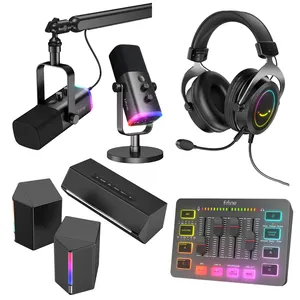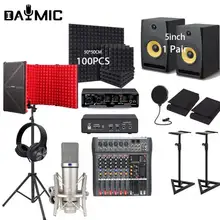What are Sound Cards
Sound cards are essential components in the realm of audio processing for computers and other digital devices. They are electronic devices that facilitate the input and output of audio signals to and from a computer under the control of computer programs. Sound cards are used by a wide array of users, from casual listeners and gamers to professional audio producers and content creators. They serve as the backbone for all audio-related activities on a computer, whether it's for listening to music, creating multimedia content, or engaging in immersive gaming experiences.
The principle of how sound cards work is relatively straightforward. They convert digital data to analog sound waves when outputting audio (Digital-to-Analog Converter - DAC) and vice versa when recording sound (Analog-to-Digital Converter - ADC). A sound card is equipped with various ports for connecting audio devices like microphones, headphones, and speakers. Advanced sound cards also offer additional features like sound processing effects, multiple channels for surround sound, and low latency for real-time audio applications.
Sound cards can be either integrated directly onto the motherboard of a computer or installed as a separate expansion card. While integrated sound solutions are adequate for general usage, dedicated sound cards provide superior audio quality and performance, benefiting those who require high-fidelity sound or specialized audio functions.
Types of Sound Cards
In the diverse ecosystem of digital audio, there are several types of sound cards available to meet specific needs and use cases. Internal sound cards are typically installed in a PCI or PCIe slot on a computer's motherboard, offering a variety of connections for audio devices and enhanced sound quality over basic onboard audio. They're commonly used by gamers, audiophiles, and professional audio editors seeking richer sound details and effects.
External sound cards, often connected via USB or Thunderbolt, provide a portable solution for laptops and computers with limited expansion options. These are popular among DJs, musicians, and podcasters who require mobility with their setup or wish to bypass inferior internal audio components.
Professional-grade sound cards offer multi-channel support and high sample rates for studio recording environments. These units often come with built-in preamps, high-quality DACs/ADCs, and extensive software packages to fine-tune audio settings.
For consumer electronics and specialized applications such as home theaters or karaoke systems, there are also dedicated sound processors that work to enhance the listener's experience by providing functions like noise cancellation, echo reduction, and various acoustic effects.
How to choose Sound Cards
Selecting the right sound card is crucial for businesses in need of bulk purchases for commercial use or resale. The decision largely depends on the specific requirements of the end-users or target market. For example, businesses catering to professional recording studios should prioritize sound cards that offer high fidelity, low noise levels, multiple inputs/outputs, and robust driver support.
When considering features like noise cancellation or support for dual streaming, companies targeting live streamers or podcasters should seek out models that cater to these functionalities. Weight and portability become significant if the end-users include mobile DJs or traveling presenters who require external, lightweight options.
For retailers serving gamers or home theater enthusiasts, multi-channel support (such as 7.1 surround) is essential to provide an immersive auditory experience. These clients may also value additional features like RGB lighting if aesthetics complement performance in their setup.
In all cases, businesses must evaluate the compatibility of the sound card with various operating systems and hardware setups. Additionally, considering materials such as metal or ABS plastic can impact durability and aesthetics—important factors for many users.
Best Sound Cards on Alibaba.com
Alibaba.com stands out as an exceptional marketplace for sourcing wholesale sound cards suited for every niche within the business landscape. Whether your clients demand cutting-edge external USB sound cards for portable high-quality audio experiences or internal multi-channel options for immersive gaming setups—Alibaba.com offers an extensive collection from reputable suppliers across the globe.
The platform's commitment to facilitating seamless transactions is evident through services like Trade Assurance—a feature that underscores the importance Alibaba.com places on secure dealings by protecting payments until order fulfillment is confirmed. This assurance is particularly critical when making substantial bulk purchases inherent to B2B transactions.
Furthermore, Alibaba.com's interface streamlines the selection process with filterable options based on function, channel support, material composition, application use-cases, and more—empowering businesses to pinpoint precisely what they need efficiently. With an expansive reach in over 190 countries and provisions for mobile purchasing and multilingual communication, Alibaba.com is tailored to help businesses scale up by tapping into an international network of quality suppliers without compromising ease or convenience.
Common FAQs for Sound Cards
What types of sound cards are best for professional recording studios?
Professional recording studios typically require sound cards with high sample rates, low latency, multiple inputs and outputs, and high-quality preamps to ensure pristine audio quality and versatile connectivity for various audio sources.
How do external sound cards benefit mobile professionals?
External sound cards offer portability and ease of use for mobile professionals like DJs and field recordists, allowing them to easily upgrade the audio quality of laptops and other portable devices without the need for internal installation.
What features should I look for in a sound card for live streaming?
For live streaming, look for sound cards with features like multiple channels for mixing audio sources, noise cancellation to ensure clear speech, and low latency to synchronize audio with video in real-time.
Are USB sound cards compatible with all operating systems?
While most USB sound cards offer plug-and-play compatibility with common operating systems like Windows and macOS, it is important to check manufacturer specifications for system requirements to ensure full functionality.
Can multi-channel sound cards improve the gaming experience?
Yes, multi-channel sound cards can significantly enhance the gaming experience by providing immersive surround sound that allows gamers to detect audio cues from various directions, adding depth to gameplay.
What materials are used in the construction of sound cards, and why does it matter?
Sound cards are often made from materials such as metal, ABS plastic, or aluminum alloy. The choice of material can affect durability, heat dissipation, and interference shielding—all important factors for consistent audio performance.
How important is the sample rate and bit depth in a sound card?
Sample rate and bit depth are crucial parameters that determine the fidelity and clarity of digital audio. Higher values allow for more accurate reproduction of sounds, which is particularly important in professional audio production and high-fidelity applications.
What kind of support should I seek from suppliers when purchasing sound cards in bulk?
When purchasing sound cards in bulk, seek suppliers who provide detailed product information, compatibility assurances with various devices and systems, and responsive customer service for any technical inquiries or issues that may arise.
What is the significance of noise cancellation in sound cards?
Noise cancellation in sound cards is significant as it helps reduce unwanted background noise during recording or playback, resulting in cleaner audio output which is essential for professional settings like broadcasting or studio work.
How does connector type affect the compatibility of a sound card?
The connector type (e.g., USB 2.0, XLR, 3.5mm jack) affects compatibility by determining which devices and audio equipment can be directly connected to the sound card without needing additional adapters or interfaces.










































 浙公网安备 33010002000092号
浙公网安备 33010002000092号 浙B2-20120091-4
浙B2-20120091-4